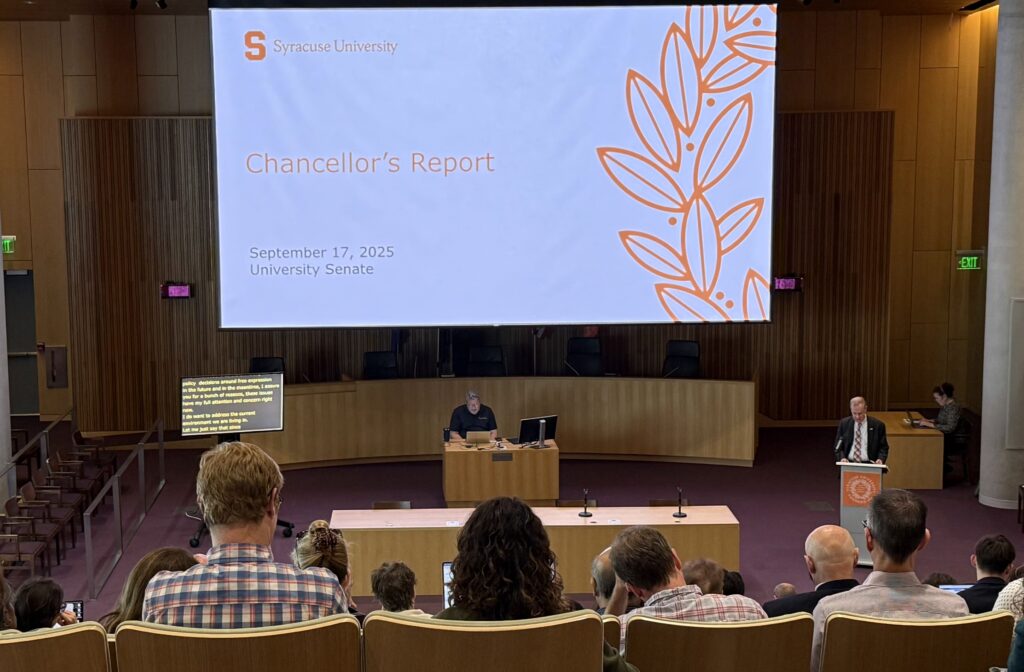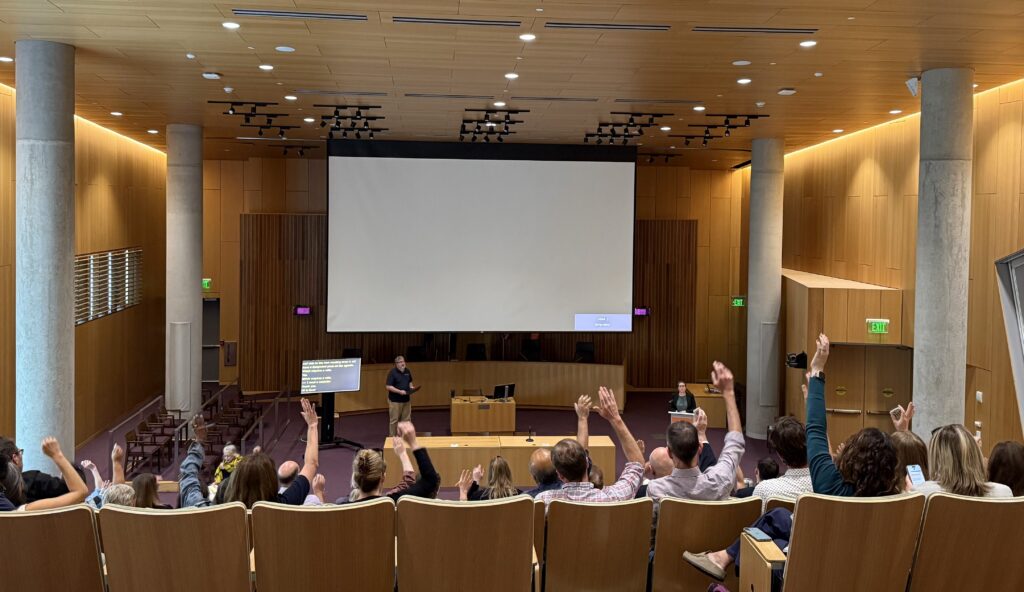SU Senate kicks off new year amid campus controversies
SU Senate starts new year amid controversies
Topics for the faculty governing body’s first meeting include paused programs and professors being placed on leave.

Editor’s Note: This story has been updated to clarify that the Daily Orange reported that one faculty member was already on medical leave, not an SU spokesperson.
Chancellor Kent Syverud opened his report for Wednesday’s University Senate meeting, thanking the faculty representatives for 95 meetings’ worth of tough and engaging questions.
The first meeting of the school year proved to be no different as Syracuse University’s top administrator had to address several topics, ranging from international enrollment to free speech debates since Charlie Kirk’s death last week.
With members of the 17 committees that make up the senate present, Syverud opened with budgeting challenges faced by the university and its respective colleges.
“Many of our peers are running very serious deficits, experiencing deep budget cuts and large-scale layoffs,” Syverud said. “That’s not the story here — although it’s not a happy story entirely, either.”
As the Trump administration continues transforming the financial ties between Washington D.C. and colleges nationwide, American higher education is facing a financial crisis. These include layoffs, program cuts, higher costs and growing uncertainty for both students and administrators, according to a Harvard report.
“The so-called ‘Big Beautiful Bill’ does not apply to Syracuse, and it doesn’t in this area because our endowment per student remains below the threshold,” Syverud said.
Syverud said that even though SU is not part of the President Trump-signed Big Beautiful Bill, the university is still experiencing a 3.5% decline in enrollment, primarily due to decreases in international and master’s level students.
“We’re about 41 students below goal overall in our master’s enrollment, and that’s largely international students, especially from China, with trouble getting visas,” Syverud said.

Following the enrollment update, Syverud addressed the issue of free speech on campus after two SU professors received attention for their social media comments earlier in the day.
“I’m going to carefully consider any recommendations as the university makes policy decisions around free expression in the future,” Syverud said. “All that said, ethical judgement calls come up a lot.”
Political science assistant professor Jenn M. Jackson and geography and environment professor Farhana Sultana responded to Kirk’s death on the app BlueSky.
“Charlie Kirk said it was worth it to have ‘a few’ gun deaths each year so that we can have the Second Amendment,” Jackson wrote in one message on the BlueSky platform. “He called those deaths ‘prudent’ and a ‘rational deal.’ Him dying this way seems both ironic and in line with his own politics. Asé.”
“Sorry, but rest in piss,” Sultana wrote from her personal account, which has since been deactivated.
Communication and rhetorical studies professor Charles Morris urged the Chancellor and Provost to reaffirm their support for professors’ freedom of speech when employees at companies and other universities have lost their jobs or been reprimanded for comments on Kirk’s assassination.
Syverud acknowledged the controversies but did not mention that any professors were on leave.
“There’s been concern that faculty members, as professionals, have not responded humanely to the event — including to the family — and have been interpreted and portrayed as condoning or encouraging violence against people with certain views: certain views that some of our students might have and might be in our classes,” Syverud said.
Provost Lois Agnew referred to the faculty manual and guidelines, saying that while free speech is encouraged, faculty should exercise restraint and respect diverse opinions.
Two days ago, Jackson shared on their BlueSky again, “Someone threatened to shoot me in front of my students today — I still won’t mourn a white nationalist.”
Just hours after the Senate meeting concluded, The Daily Orange reported that two faculty members were currently on leave following controversial social media posts related to Kirk.
The D.O. reported that the University is aware of faculty social media activity and confirmed that one faculty member is currently on leave, but another was already on medical leave before their comment.
At the beginning of his report, Syverud briefly mentioned Diversity, Equity, and Inclusion (DEI) programs in the context of faculty feedback. Morris then brought it up again as one of the reasons behind faculty unsettlement.
“One (of these reasons) is the new unit that’s now called ‘People and Culture,’ which you know, for some was a politically expedient, if not morally cowardly, renaming rhetorically,” Morris said.
Crystal Bartolovich, president of the American Association of University Professors’ executive committee, raised concerns about the portfolio review process that SU has announced
Bartolovich said that during a Monday meeting at one of SU’s colleges, department chairs were informed that decisions had already been made about which programs would be paused for the 2025–2026 academic year.
Bartolovich shared a list of 15 programs that were allegedly paused without any faculty input. Among them were African American studies, Middle Eastern studies, Modern Jewish studies and Russian language and culture.
With Syverud raising the importance of shared governance at SU earlier in the meeting, Bartolovich criticized the lack of shared governance in the decisions to pause programs without faculty approval.
“I mean, it boggles my mind that this happened,” she said.
Agnew said the programs would be paused for one year, after which they would either be revised, closed or merged with others. She cited low enrollment and interest as the main reasons for the pauses.
The Curriculum Committee proposed a resolution requiring that any program pause or elimination be reviewed by the committee and then referred to the University Senate for a vote before any final decisions are made. The vote was postponed after senators rejected extending the meeting. The resolution will be decided at the next meeting on Oct. 22.
